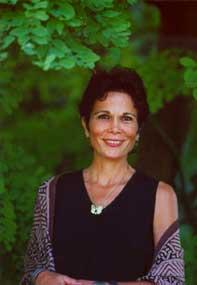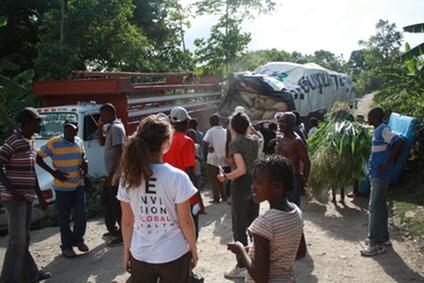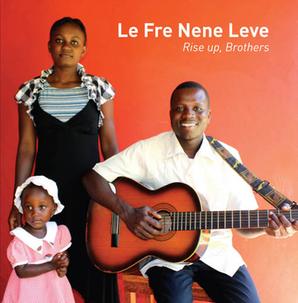 Julia Alvarez is the author of 19 books, including How the García Girls Lost Their Accents, In the Time of the Butterflies and the new A Wedding in Haiti. A writer-in-residence at Middlebury College, she and her husband, Bill Eichner, established Alta Gracia, an organic coffee farm/literacy arts center, in her homeland, the Dominican Republic.
Julia Alvarez is the author of 19 books, including How the García Girls Lost Their Accents, In the Time of the Butterflies and the new A Wedding in Haiti. A writer-in-residence at Middlebury College, she and her husband, Bill Eichner, established Alta Gracia, an organic coffee farm/literacy arts center, in her homeland, the Dominican Republic.
For most writers, all experience is, in a sense, potential material whether or not the experience is literally translated in book form. Was there a particular moment when you decided to write about Piti's wedding or was it more of an organic process?
A Wedding in Haiti was definitely a book that went through its very own organic process. I had no intention of writing about going to Piti's wedding. I always keep journals when I am traveling because I find I get lost when I don't have my routines, my practice of writing, of having a story line to follow through the labyrinth of experience.
So, on this journey I was just keeping my regular travel journal. And believe you me, I needed it! All the history and fears and amazing surges of joy and deep profound connectedness as we went on that first trip! I needed the writing to calm me down and help me understand what was happening.
When we returned to Vermont, my Haiti journal was just one more addition to my shelf of journals. Six months later, the devastating earthquake happened. I took down the journal and reread it, as a way of being with Haiti, of positing something other than the devastation.
That's when I realized: this is one very small but luminous story to put out there. I believe that's how we rebuild after a devastation, one person, one story at a time. And so I started working on the story of Piti's wedding. Just his wedding. But my wise editor, Shannon Ravenel, rightly said: the book needs to acknowledge what has happened, perhaps a short epilogue about the earthquake.
But how can you write a short anything about such a huge and horrific loss? The short epilogue turned into the second half of the book! I was riding a huge and powerful wave, and the only thing I was in control of was sentence by sentence what I could write down to arrive at the end of a section or paragraph
What did you learn about yourself--and your family--through the process?
The best journeys take place not just across a landscape but internally. And this was true of our two trips to Haiti. But also, in the writing of A Wedding in Haiti, there were many discoveries.
Both my parents were living at the time, both afflicted with Alzheimer's. Both journeys to Haiti started out from their house in Santiago, so their presence and love story were bookends on this journey and gave the love story I was telling of Piti and Eseline a depth and dimension that wouldn't otherwise be there. And of course, as a couple on this journey, Bill's and my own love story entered into play. The interconnectedness of all of us was brought home so often I wondered how we keep forgetting we are one human family.
The most important thing I've learned in writing the book is that the ground had shifted under my feet as a storyteller. I actually can't tell you yet what that will mean for me in the future as a writer. One of the questions and quests in the book concerns what the role is of the storyteller in the circle of social justice and transformative change. What can a story do for us that nothing else in our human experience can do in this same stirring, powerful way?

What, in your opinion, is the future of Haiti? What is the best, most effective way for individuals to help the people of Haiti?
I think it's for Haitians to figure this out for themselves. What we can do is offer help when they ask for it, and in the form they ask for. Not land the Marines and impose our solutions on the Haitians. Or send experts to figure things out for the Haitians. This kind of helping perpetuates the cycle of enslavement. A moral imperialism, I call it.
Let Haiti lead; let Haiti tell us; let Haitians know we are with them, walking with them, not abandoning them after the hot breaking news of its tragedy is over, and the cameras and journalists pack off to the next sensation.
We can start by seeing Haiti. In large part that is why I wrote this book. To see Haiti and to report as accurately as I could what I had seen. For years the pundits of the First World have been saying that Haiti has failed. Has it? I mention late in the book that Haiti has a lot to teach us.
I know that tragedies that are with us every day are harder to see. That's also why one of the important themes that came out of A Wedding in Haiti is the importance of seeing--really seeing another person or place or situation without the lens of our own bias or preconceptions. This kind of vision is transformative.
You've said that, as a native of the Dominican Republic, Haiti is "the sister I never knew." Now that you know her a little better, do you think it is possible for Haiti to climb out of poverty and potential ruin without more help and/or acceptance from the country with which she shares an island?
I don't think any country can give itself the "luxury" of thinking that it can survive apart from the rest of the world, which has to share our only planet, with its depleting resources. But of course, this is intensified when two countries share a relatively small landmass like Haiti and the Dominican Republic. History, beginning with the arrival of the conquistador Columbus, has worked against us, by pitting one against another. Both colonies were pawns of wars going on far away in Europe between France and Spain. As with all troubled bordering nations, there is a long list of atrocities and blame that each one marches out to justify vengeful actions against the other.
Among the most deplorable was the 1937 massacre of Haitians living in the Dominican Republic. This coming October will be the 75th anniversary of that massacre. For a long time, I've been talking with Dominican and Haitian writers and artists, and friends from the States, about doing a commemoration on the border. So, I'm putting out the word: on October 6, 2012, a Saturday, we will gather at the border-- writers, artists, farmers, people in solidarity from both sides and from around the world are invited to come together--to create a Border of Light, filling that "no man's land" of the border with poetry, music, dancing, storytelling, conversation, communion. We are hoping that we can spread the word, through cell phones, Twitter, Facebook, interviews like this one and the old trustworthy "Radio Bemba" (the Dominican expression for gossip), and that people will show up.
So, 75 years after we were defeated by history, we are hoping for a great tidal wave of folks to gather together and make hope and history and friendship rhyme.
How have things changed for you, your family and Piti's family since your second trip to Haiti?
I'm glad you asked how we've all been changed by this experience. One of the subtitles I vetoed for the book was "A Memoir." I said, if we are going to call it anything, let's call it an "USmoir"!
After the trip, Piti and other Haitian friends living in the Dominican Republic redefined the mission of a support group they had founded, CJM, Cooperative Jeunes de Moustique, Young People of Moustique Cooperative, from one of just helping each other to one of working towards the future of Haiti. Because of our journey to Port-au-Prince, Piti also became more politicized.
Now we are all looking forward to Ludy starting preschool this coming fall. Starting her this young (3½) will give Ludy that extra boost and ensure that she will have the education and opportunities her parents never had at her age.
 Meanwhile, Piti is cutting a CD! He has a wonderful singing voice, and he learned to play the guitar from a volunteer who came to Alta Gracia. With the help of my husband, Bill, and stepdaughter, Sara Eichner, an artist and graphic designer, we hope to have copies of the CDs with us on tour. Hey, if Martelly can become president, Piti can become a rock star!
Meanwhile, Piti is cutting a CD! He has a wonderful singing voice, and he learned to play the guitar from a volunteer who came to Alta Gracia. With the help of my husband, Bill, and stepdaughter, Sara Eichner, an artist and graphic designer, we hope to have copies of the CDs with us on tour. Hey, if Martelly can become president, Piti can become a rock star!
I think in large part because of the experience with Piti and our trips to Haiti, and with our own project Alta Gracia, Bill and I are asking ourselves how we want to serve with the resources, time and talents we have left. I mentioned above, that as a writer, I am asking myself, what is my role as a storyteller. The ground has shifted for me. Ambition, proving myself, being admired or celebrated as a writer--the old gasoline that ran this personality, well, it just doesn't power me anymore. What does? I'm not sure. But I've always felt that one of my responsibilities as a storyteller is to stay at that still unformulated edge, to be asking the questions, to be listening and paying close attention. Not to fall into the temptation of closing down because of fear or just to please readers with what I've done before. My allegiance to them is to be as clear-eyed and as disciplined as I can be, so that I deserve the time they spend reading my books. --Debra Ginsberg

